

Rosseau Lake College
Contributing to the future of Lake Rosseau
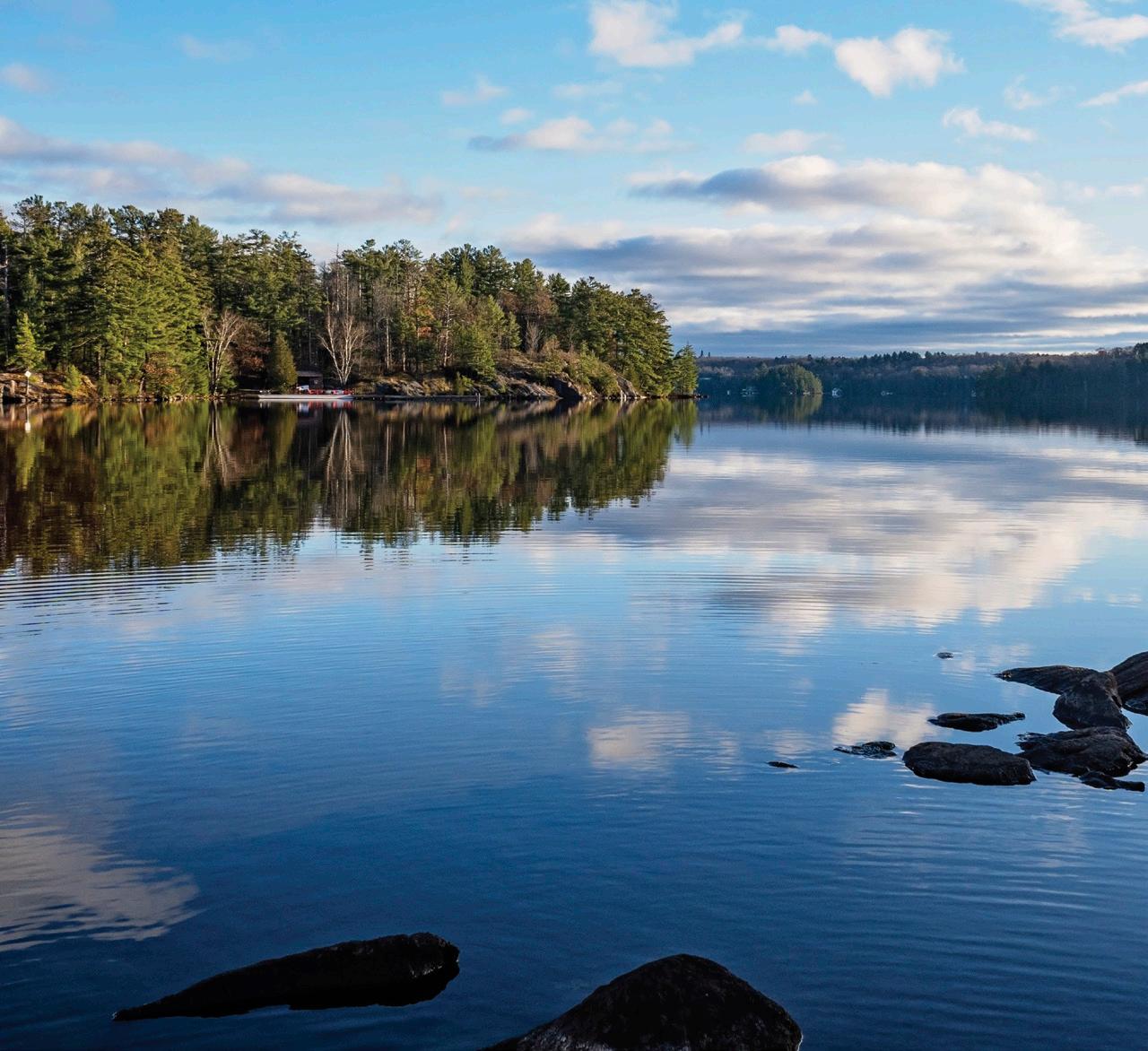
A sense of place
A childhood adventure nurtured and guided by RLC.
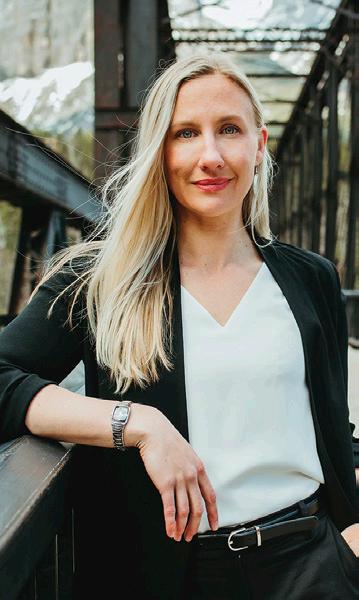
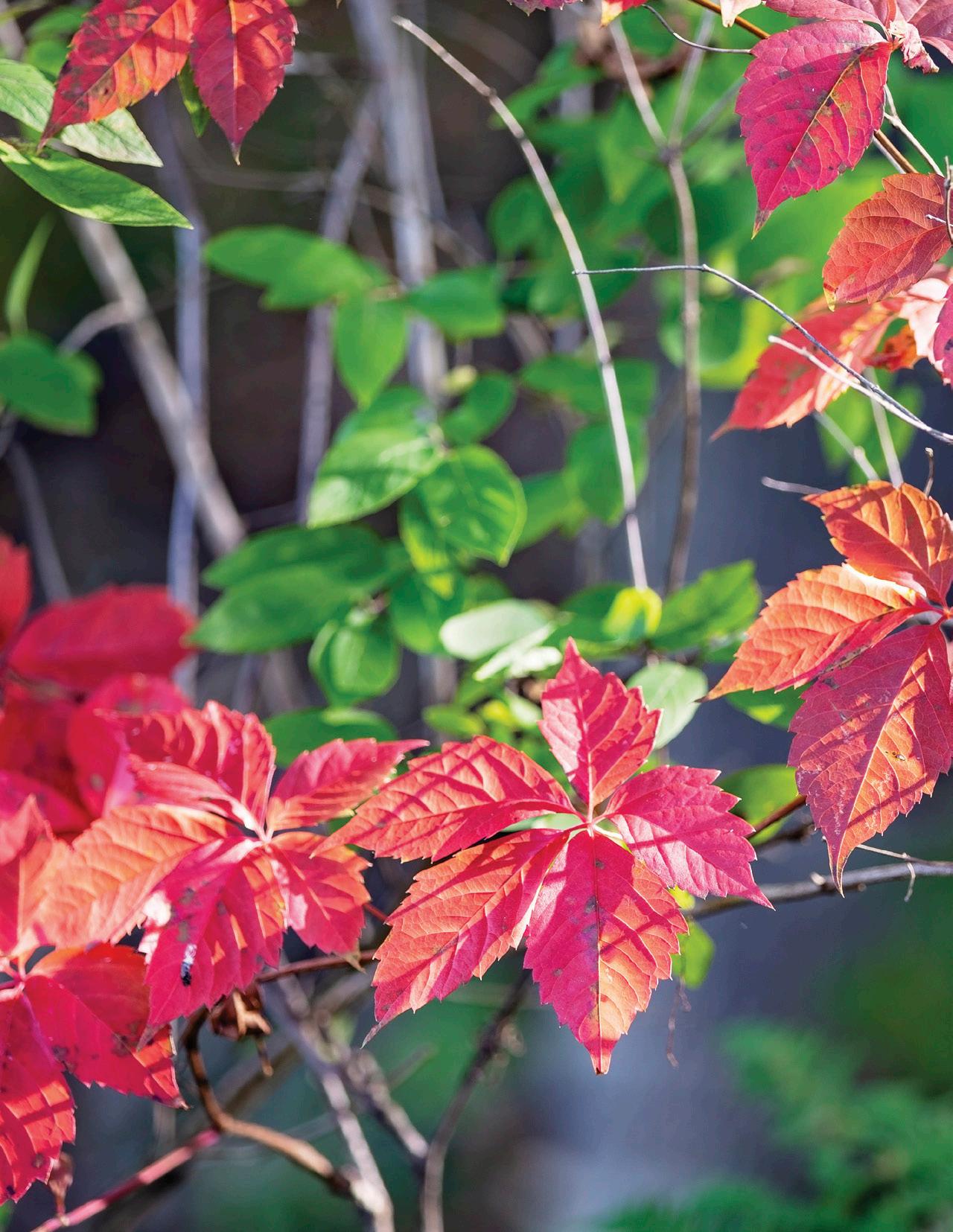
Growing up in Rosseau, Samantha Brett ‘04 recalls venturing out on her bike as soon as she was old enough to cycle the roads in and out of the village. “I craved a deeper understanding of the world around me,” she says. She found it by exploring the wetlands, forest, and the lakes that define the region.
Enrolling in Grade 9, “what began as a childhood adventure,” she says, “was nurtured and guided by RLC.” It extended her engagement with and understanding of the natural world. It also brought her into contact with peers from around the world, those who brought new insights and new passions. Where we learn can be as important as what we learn, and that was true for Samantha. Being in Rosseau, gaining a unique, personal perspective on the natural world, was a key aspect of her education.
After RLC Samantha earned a Master’s in Environment and Management and a Graduate Certificate in Climate Change Policy and Practice from the University of Toronto. In 2014, she founded Iron Oaks Environmental Management, consulting on major energy infrastructure projects in Western Canada. Today she is also a Senior Environmental Advisor at TC Energy, specialising in regulatory project management and reclamation ecology.
In 2024 Samantha addressed the graduating class by saying “remember the subtle gifts of this place. They are special, and they are yours forever. … My wish for you is that you continue to feel nurtured by this place, the community and the beauty of the natural environment that surrounds you. You are in one of the most extraordinary places on earth.” She finished by saying, “RLC taught me to contribute meaningfully to the communities I am a part of. And that you get what you give.”
A matter of trust
Conserving the culture, nature, and traditions of the region.
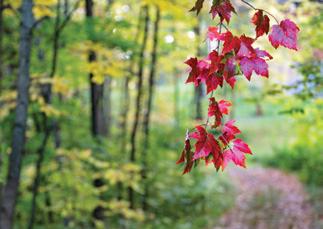
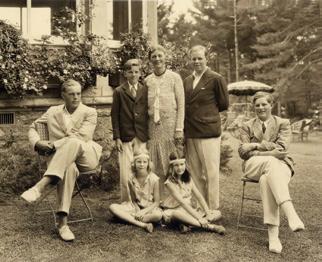
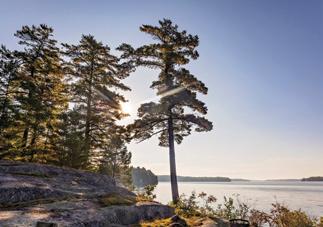
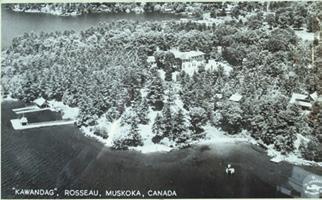
RLC was established in 1967 on what was once the Eaton family estate. Hints from that time remain—the recently restored log cabin, the stone stairs, the sauna on the beach. The swim dock has been rebuilt, but is a faithful replica of the one that was here when the Eatons were.
Less obvious, but more important, is an ongoing stewardship of environmental ecology of the site: the tracts of forest, the watershed, the more than 3000 feet of near pristine Lake Rosseau shoreline. Those things, it’s safe to say, are still here precisely because the school is still here.
We’re proud of what we’ve maintained, and equally proud of what we’ve brought to the region. For those nearby, RLC offers an opportunity to learn in an international academic environment. With the advent of the Seven Generations initiative, that opportunity has extended significantly to local Indigenous communities (See “Seven Generations,” p. 6). The first Indigenous student attended RLC in 1992, and we’ve had students from local communities enrolled at the school every year since, many supported by a robust scholarship program.
We’re proud that our students feel at home here, on campus and in the community. They volunteer within the village of Rosseau; they visit the bakery, the General Store and the post office, where many of them are known by name. That is an analogue, I feel, for the place that RLC has always had within the surrounding communities: living, spending, and contributing locally. Now, as always, we source services, trades and materials from local suppliers. Since 1967 the school has employed local—cooks, operations staff, teachers, administrators. We’ve also employed local trades. The man who repointed the stonework last year in the log cabin, Lorne Fraser, is the grandson of the man, Allan Fraser, who built that stonework a century ago. Lorne’s mother, Darlene, worked in our dining hall.
Those kinds of connections are part of our story, and will continue to be as we move into the next phase of our life (see “Elevate” p. 4). In the relationships that we have with the land, the history, the culture, and the people of this region, I’m proud to think that RLC has been a good neighbour for more than half a century. We intend to be one for the next half century and more.
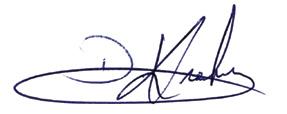
Dave Krocker Head of School
ELEVATE
It’s time to grow
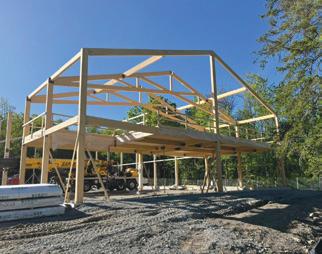
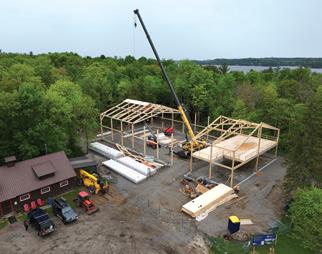
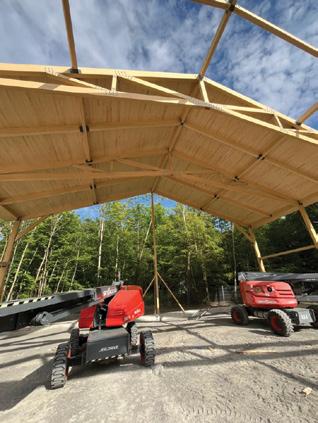
Key Areas of Development
1. Campus renewal: Elevate is a decade-long initiative to further develop the RLC campus. It includes the creation of a recreation facility, innovative teaching spaces, and environmental stewardship.
2. Program Development: Developing our Seven Generations initiative and outdoor education program to serve as national examples within the industry
3. Endowment Fund: Securing the long-term financial health of RLC
The Elevate initiative is the most ambitious capital project in our history, initiated in part by the largest single donation that the school has ever received. Elevate is also the first comprehensive campus renewal project in our history, one that touches all aspects of the school. Over the next decade it will add athletics facilities, teaching and learning spaces, staff housing, and infrastructure.
Building on our strengths
We have committed in our current strategic plan to remain at the forefront of private and independent schooling in Canada.
But this is also about the role that we can play in communities that we are a part of. Locally, it will provide a place to meet, train, and compete. Within the education industry, it will continue to establish the school as a leader in reconciliation and experiential education.
Preparing for our future
In 2023, alumnus Darren LeClair ‘84 took the role of Construction and Project Manager. He brings a depth and breadth of expertise as well as a deep, personal engagement with the school. In taking on this project he has said, “We’re in a better place than we have ever been. There’s nothing but potential I see in Rosseau. … I think it’s time to be more assertive about what we can do. What if we just push this a little harder? What could we achieve?”
The initiative is ambitious, and that’s intentional. We’re undertaking this period of renewal because we have a lot, and we have a lot to give.
The Recreation Centre The STEAM Complex
The Recreation Centre will increase indoor recreation and athletic space six-fold (650%), enhance the student experience and allow for a broader range of coaching and competition.
It will provide a venue for:
• Sports-specific training
• Team competition
• Wellness programming
• Formal and informal gatherings
• RLC and community events
• Indigenous events & gatherings
The facility includes:
• Outdoor seating/learning areas
• Reception area
• Team areas for gathering/learning
• Strength and conditioning space
• Barrier-free washrooms
• Universal shower, change rooms
• Media centre for announcements/teaching
• Full size basketball court which can also be used as two half basketball courts with side-mounted nets or a full-sized volleyball court
• Fixtures for badminton and pickleball
• Retractable bleachers for spectators
The design honours regional traditions while signalling our future as an educational institution. The centre will contribute to the longer-term goal of optimising partnership opportunities with community organisations.
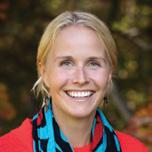
“ We feel most alive when we are moving. It brings me joy to empower young people to find strength through activities that challenege them.”
Jaqueline Priolo, Director
of
Co-Curricular Progrms
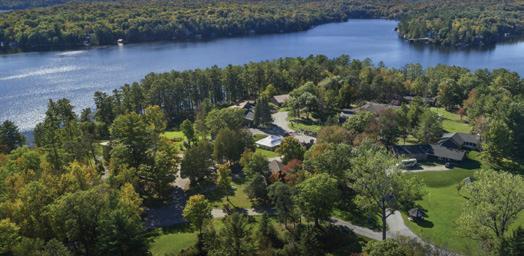
The STEAM Complex (Science, Technology, Engineering, Arts, and Mathematics) will provide a cutting-edge teaching and learning environment. This space is designed to:
• support critical thinking, collaboration, and innovation
• inspire students to exchange ideas and make new discoveries.
• prepare students for life, regardless of the profession they choose to follow.
The STEAM Complex will add 50% to the total academic space suited to our current and future curriculum.
• 6800 square feet
• 4 innovative learning labs
• 1 innovative science lab
• Central hub/collaborative space
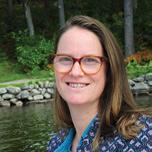
“ The more than we can make our learning replicate what we actually do in life, the more useful that learning is going to be to us in our lives.”
Jessica Sheppard, Assistant Head of School, Academics
Seven Generations
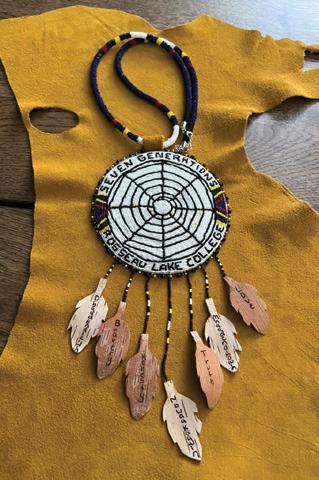
The Mino-Bimaadiziwin award was created in 2024 to celebrate the goals and the spirit of the Seven Generations program. Mino-Bimaadiziwin is an Anishinaabek word meaning “a good life.” The award, hand crafted by alumnus Meaghan Tabobondung ’17, is given annually to the student who best reflects an ability to achieve a balance between body, mind, heart, and spirit.
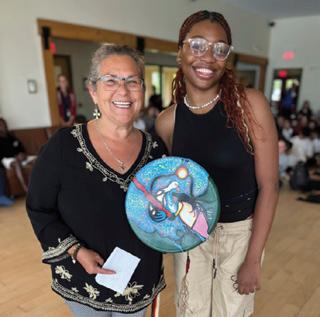
Seven Generations is a vital and integral part of the RLC’s identity, curriculum, and student experience. This initiative, now in its third decade, is built in partnership with key leaders, including Victoria Grant. A recipient of the Order of Canada, she is recognised for her work in “bridge[ing] the gap between Indigenous and non-Indigenous culture, businesses and communities, through … facilitation and mediation.”
There is the desire to see RLC emerge as a school leading with a pedagogy that celebrates Indigenous traditions of teaching, learning, knowledge, and culture, including the relationship to nature. It would continue to successfully address the barriers—geographic, personal, institutional, financial, and cultural—that students may encounter.
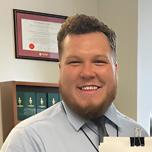
“ There is joy in just being able to use the skills I’ve developed to build and maintain relationships between Canada and the First Nations communities, helping them to realize the change they want to see.” -Zoyer Clayden Tabobondung ‘14
Seven Generations is led by Dawn Tabobondung, a member of Wasauksing First Nation. Dawn comes from a family of leaders that include family members going back seven generation. Flora Tabobondung served for twenty-seven years as Chief of Wasauking First Nation. Flora was invested into the Order of Canada in 1988 for her contribution to the betterment of her people. Dawn's mother Joyce was the Robinson Huron Treaty Chief. Her brother, Warren Tabobondung, is the current Chief of the Wasauksing First Nation.
The RLC Annual Pow Wow
A community celebration
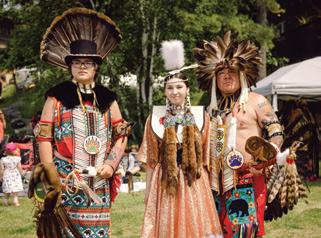
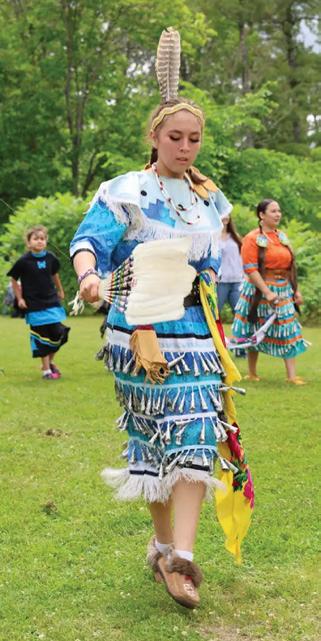
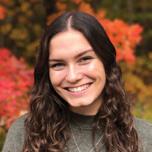
Pow Wows are social gatherings that honor Indigenous Culture throughout Turtle Island. In 2019, Courtney Tabobondung '20 used her Grade 12 Discovery project to imagine, organize and host RLC’s first ever Pow Wow. “I wanted to find a way to enhance the Indigenous culture at Rosseau and to bring more awareness to Indigenous people,” she says. “I felt that Rosseau needed a breath of fresh air, and for the Indigenous students, to make them feel appreciated and seen.”
The event has grown into an annual celebration bringing together members of all of our local and shared communities. The school Pow Wow allows for the Indigenous students to share their heritage and traditions while fostering an understanding of Indigenous culture. The Pow Wow has quickly become a cherished day for the RLC community hosted on campus every Spring, and for others to visit and experience the school. All are welcome and encouraged to attend.
“ I was motivated to pursue my goals of becoming an Indigenous health researcher in order to help improve the health and well-being of Indigenous Peoples.”
- Olivia Franks ‘15, is from Wahta Mohawk Territory and was the third of three siblings to attend RLC. She is enrolled in the kinesiology program at Queen’s University where she has served as project coordinator for the Queen’s University Indigenous Mentorship Network to provide Indigenous scholars and trainees with mentorship, training, and opportunities to engage in Indigenous health and well-being research. She is a member of the RLC Board of Directors.
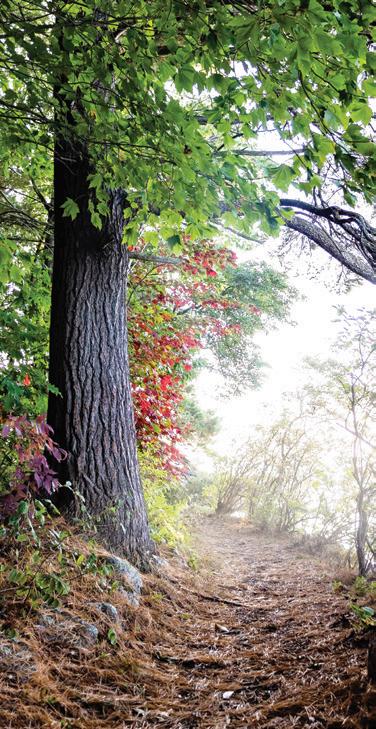
Rosseau Lake College contributes to educational, economic, and social development through:
• Educational opportunities: High-quality education to local students, with graduates progressing to major universities.
• The Seven Generations Initiative: A culturally sensitive pathway for Indigenous students to higher education, supported by a robust financial assistance program.
• Employment: Job opportunities for teachers, operations staff, administrative staff, and support personnel.
• Economic impact: Contributing significantly to the local economy through employment and school-related spending on supplies, trades, food, and transportation. The presence of an acclaimed boarding and day school positively impacts demand for housing and accommodation.
• Environmental Stewardship: RLC is a careful and sensitive custodian of the forest, watershed, and more than 3000’ of lakefront.
As a private institution, Rosseau Lake College relies on the generosity of donors. Tuition fees cover basic operations, but philanthropic contributions are crucial for funding scholarships, campus improvements, and developing signature programs that enrich the student experience.
Dave Krocker, Head of School
705.732.4351 / School
343.997.1226 / Mobile
dave.krocker@rosseaulakecollege.com
Kim Morton, Director of Advancement
705.732.4351 / School
905.409.9754 / Mobile
kim.morton@rosseaulakecollege.com
